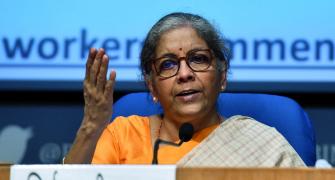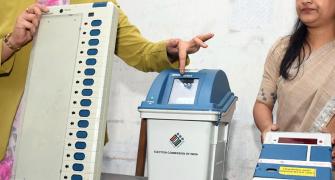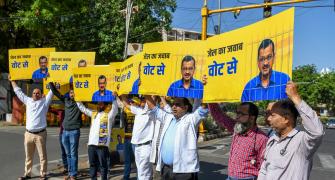A communiqué sent by the department of investment and public asset management (DIPAM) to the heads of all PSUs, said the move would help the government to get predictable and periodic dividends before Budget estimates are firmed up.

Illustration: Uttam Ghosh/Rediff.com.
Staring at a revenue crunch, the government has asked rich state-owned firms (PSUs) to start paying dividends on a quarterly basis, even as it has demanded higher share from profits of all its companies.
Aiming for a ‘predictable and staggered’ dividend regime, the government told the state-owned firms to not go by the rulebook in paying the bare minimum dividend but to strive for giving out more dividends.
“The central public sector enterprises, especially those that pay relatively higher dividends (100 per cent dividend or Rs 10 per share as the case may be), may consider paying interim dividend every quarter after quarterly results. Other central public sector enterprises may consider paying interim dividend half-yearly,” the ‘advisory regarding consistent dividend policy by CPSEs’ dated November 9 stated.
The communiqué, sent by the department of investment and public asset management (DIPAM) to the heads of all PSUs, said the move would help the government to get predictable and periodic dividends before Budget estimates are firmed up.
All State-owned firms should consider paying at least 90 per cent of the projected annual dividend, in one or more installments as interim dividend, DIPAM said.
Most State-owned companies pay the year’s interim dividend in February or March. “Such bunching of interim dividend payouts in February-March may compete with their cash availability for year-end payments to suppliers as well as towards advance tax,” the DIPAM advisory stated.
Experts said the government was asking the PSUs to follow a practice that is already being followed by private sector peers and is on expected lines due to the imminent shortfall in revenue this fiscal year.
Current norms prescribe PSUs to pay a minimum annual dividend of 30 per cent of profit after tax or 5 per cent of net worth, whichever is higher.
“It has, however, been observed that many PSUs usually consider only paying minimum dividend according to the guidelines. PSUs are advised to strive for paying higher dividends, taking into account relevant factors like profitability, capex requirements with due leveraging, cash or reserves, and net worth,” the DIPAM advisory stated.
Devendra Pant, chief economist, India Ratings & Research, said: “This move is mainly is because of the government’s financial position. If the outgo by state-owned firms is given in two or four installments, rather than one, companies will be able to maintain better cash flow and it will avoid any abrupt change in the government’s borrowing requirements. It will not have any adverse impact on the bond market.”
DIPAM said that only PSUs without any “possibility” of dividend payout, according to the minimum prescribed norms, can pay interim dividend annually during October or November based on projected profit after tax, with the declaration of second quarterly results.
“A consistent dividend policy would also help revive investor interest and improve market sentiment for central public sector enterprises stocks, as practicability in regular or quarterly dividend payment would attract quality investors to central public sector enterprises stocks and retain them in the hope of a future dividend,” the DIPAM advisory stated.
The government collected Rs 4.6 trillion from taxes in the first six months of this fiscal year, 32.6 per cent lower than in the same period of 2019-20. PSUs paid Rs 43,000 crore as dividends in 2017-18, which were projected to go up to Rs 48,000 crore in 2018-19, according to revised estimates. The government expected Rs 66,000 crore under this head this fiscal year.










